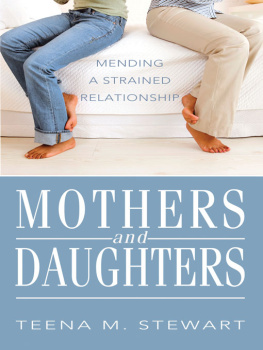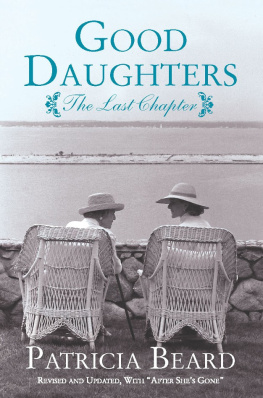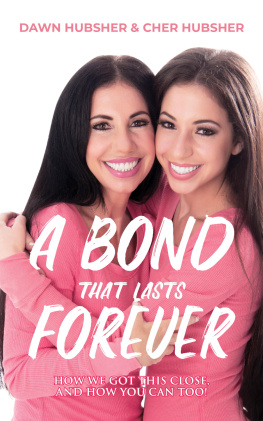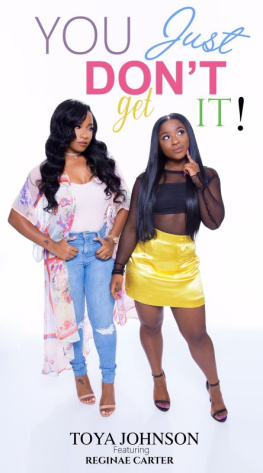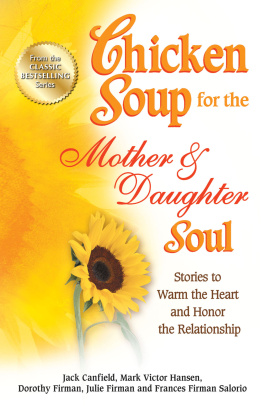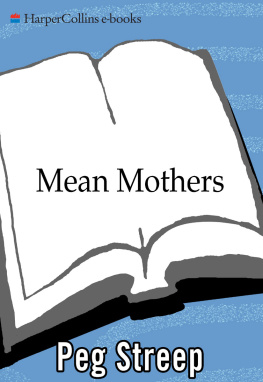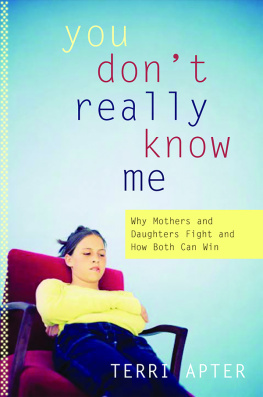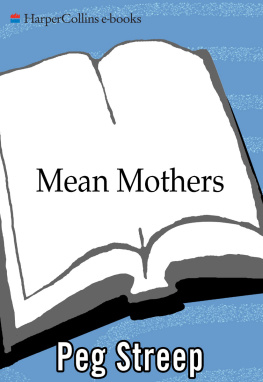

Copyright 2012
by Teena M. Stewart and Beacon Hill Press of Kansas City
2012 eISBN 978-0-8341-2954-2
Printed in the
United States of America
Cover Design: Darlene Filley
Inside Design: Sharon R. Page
All Scripture quotations not otherwise designated are from the Holy Bible, New International Version (NIV). Copyright 1973, 1978, 1984 by International Bible Society. Used by permission of Zondervan Publishing House. All rights reserved.
Scripture quotations marked KJV are from the King James Version.
Library of Congress Cataloging-in-Publication Data
Stewart, Teena.
Mothers and daughters : mending a strained relationship / Teena M. Stewart.
p. cm.
Includes bibliographical references (p. ).
ISBN 978-0-8341-2836-1 (pbk.)
1. Mothers and daughtersReligious aspects,Christianity. I. Title.
BV4529.18.S74.2012
248.8'431dc23
2012011674
To my mother, whose words and actions still speak wholeheartedly of her love for me.
This work reflects the authors present recollections of her experiences over a period of years. She conducted numerous interviews with women regarding their mother-daughter relationships. Because of the sensitive nature of the content, certain names have been changed to maintain confidentiality.
Many thanks to the numerous women who were willing to share so openly about their relationships with their mothers.
CONTENTS
Several years ago after an exasperating phone call from my mother, I poured out my frustrations during my womens small-group meeting. I cant recall the exact details of the cause of my distress. I had most likely been subjected to a run-on dialogue and had listened at length to a string of negative complaints from my mother regarding her real or imagined illnesses or fears that the world was out to take advantage of her in some way.
I felt absolutely alone and miserable in my broken mother-daughter relationship. As I finished sharing my heartache with my small group, I was surprised to learn that several other women were experiencing similar struggles. I indeed had wondered, Are there others as well?
Following that meeting, I polled other women acquaintances, including some writer friends online, and found that many had strained relationships with their mothers. Their challenges range from controlling mothers who cant let go of the reins to deep-seated hurts caused by severe dysfunction.
Mothers and daughters have a unique bond. Fathers may love their daughters but will never know what it means to carry a child inside a womb for nine months, nor will they experience the excruciating pains of childbirth. Nor do most fathers understand the sacrifices mothers make in order to keep the children they bore safe and nourished.
Mothers love muchsometimes too muchunintentionally twisting their love into distorted smother love. What daughter at one time or another hasnt felt the sting of well-intended motherly advice intended to protect and guide her? Too many of these negative encounters may cause us to promise ourselves that we will make every possible attempt never to be like our mothers.
Many women harbor matraphobia, the fear of growing up to be like ones mother. Despite that dread, many of us find ourselves walking in our mothers footsteps. We experience the same hearttugging as our own mothers did when our daughter takes her first step, goes off to kindergarten, learns that Santa Claus isnt real, secures a drivers license, or eventually marries and starts her own family.
We do things we thought we would never do to try to protect our children from harm. We say things we never thought we would say, examining ourselves with astonishment as we realize that the motherly clich weve just spouted came directly from the lips of our own mother. Suddenly we begin to understand. Mothering is hard, and it doesnt get any easier when our children move out on their own. Elizabeth Stone put it succinctly when she wrote, Making a decision to have a childits momentous. It is to decide forever to have your heart go walking around outside your body.
It is my hope that this book will bring a greater understanding between mothers and daughters, will tighten their bonds, will ease the chaffingeven if just the slightest amountso that we move one step closer to heaven and farther from the difficult relationships many of us experience.

My mother and I have an understanding. Weve agreed not to understand each other.
Renee Zellweger as Beatrix Potter in the movie Miss Potter.
For nearly ten years my husband, my children, and I lived in Erie, Pennsylvania, in a 1920s two-story rough brick home with a fullsize attic and a postage-stamp-sized backyard. Tightly nestled between two neighboring houses, it boasted a spacious front porch, which made up for its small yard. The porch was enticing, the kind made for sitting outside during raging thunderstorms and breathing in the musty scent of rain from the safety of a porch swing.
Our Erie home also had a detached two-and-a-half-car cinderblock garage. Near the peak of the garage roof were paned windows that allowed natural light to stream in. We often left the garage door open during the day so the kids could have easy access to their outdoor toys. Consequently, an occasional bird flew in. Fooled by the light from the windows, the creature would futilely beat its wings against the glass, unaware that freedom lay behind it.
At times while pining for and trying to duplicate good mother-daughter bonds, I have identified with those desperate birds beating frantically against a closed window. My wings have felt tattered, my emotions bruised. How I have longed to be a daughter who calls her mother for happy weekly chats or goes with her out to dinner or shopping excursions! Instead, when the phone rings and I see my mothers name on the caller ID, I dread answering. The relationship I share with her is not ideal. It is, however, improving and has moved from a work of destruction to a work of reconstruction.
THE TIE THAT BINDS ALSO GAGS
I never realized I had a poor relationship with my mother until my father died when he was fifty. We were very much alike; consequently, we were always close. We shared the same passion for reading and collecting books. We both had a strong creative streak and an aptitude for art. Dad was skilled with pencil and paper, and I remember with delight sitting in the attic looking through his old art books and sketches. He also loved to sing and play the harmonica. Music strengthened our tie.
In my mind I can still hear his rich baritone voice resonating through our churchs small sanctuary as he sang in the mens quartet. In high school I, too, discovered my musical abilities and participated in concert choir, madrigals, girls barbershop group, and an interdenominational Christian singing group called Remnant. The bond Dad and I shared was special.
My parents were both Depression-era childrenpractical and hard-working. They could squeeze a dollar out of a nickel. I endured countless lectures on running a minimal amount of bathwater in the tub and how to make do with only one paper towel. Nevertheless, despite his frugality, my father knew how to play.
It wasnt until I was a young married that I realized Mom didnt really play. I dont think she ever learned to enjoy life. For her, living equals drudgery and responsibility, an uphill battle in a dark and threatening world.
Next page
